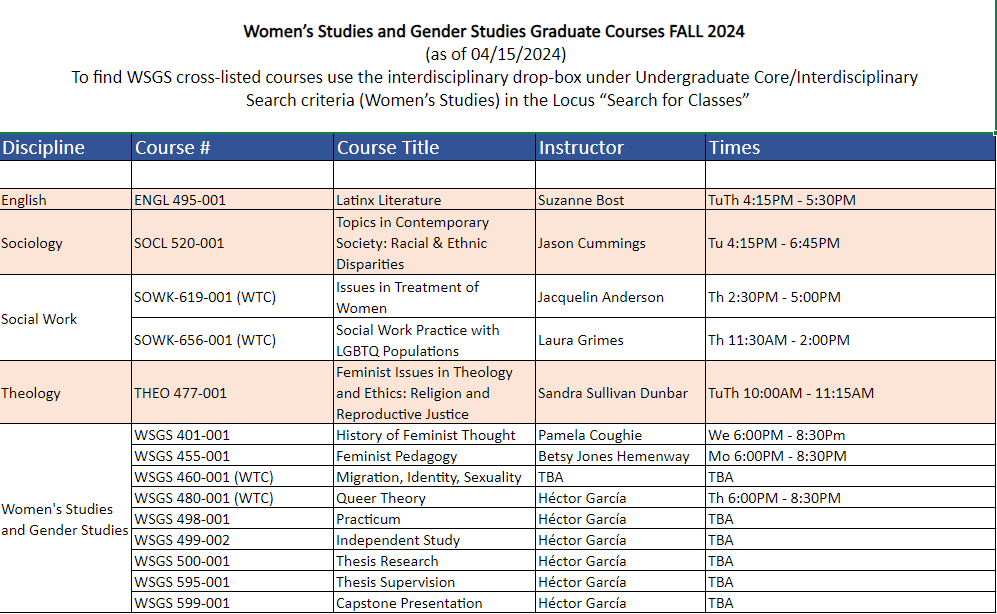Course Offerings and Descriptions
Fall 2024 Course Offerings
Graduate
The image below shows the Women's Studies and Gender Studies graduate classes available for Fall 2024.
To see a larger PDF version click the link: Fall 2024 WSGS Graduate Courses 
To see course offerings from previous semesters, scroll down.
More information about many of these classes can be found below.
WSGS Graduate Course Descriptions
A requirement for the WSGS MA, this course focuses on the history and development of feminist thinking since the late eighteenth century and the impact of feminism on western and transnational culture. We will concentrate on some of the important texts of this period and consider their influence on the lived experiences of women. We will also study the various ways feminists have envisioned social, political, and cultural inequality and change. While primary focus of this course is on U.S. and European feminist history, we will place that history within the larger context of feminist thinking and women’s movements around the world.
WSGS 402 begins with a history of women's education in the United States and traces the institutional and intellectual development of women's studies as a field, focusing on the evolution of women's studies in the academy (here and in other countries) and on the changes in concepts of knowledge, in methodologies, and in pedagogy that women's studies scholarship has produced in various fields.
WSGS 402 also introduces students to archival research using Loyola University's Women and Leadership Archives.
This course fulfills Global requirement for WSGS Graduate Students.
The course maps the field of global feminist studies and offers critical tools to understand a series of interconnected phenomena (Western material and cultural hegemony and its impact globally, the condition of black and non-Western women and their activism, non-binary and non-normative sexual identities and their rights, transnational and postcolonial female migrations) globally. The course also considers the impact of works by global feminists on issues such as human rights, violence against women and transgender individuals, and sex labour and exploitation.
This course will focus on distinctly feminist ways of learning and teaching. As with feminist theory and research methods, feminist pedagogy has been understood to include characteristics like self-reflexivity, de-centered authority, standpoint epistemologies, examinations of power dynamics, and attention to embodied ways of learning and knowing.
Outcomes: Understand the foundational principles of feminist pedagogy and related approaches to teaching. Develop skills to analyze and produce sound teaching practices within a feminist intersectional framework.
We will explore how crossing "borders," identity politics, gender, and sexuality intersect to produce a conversation on contemporary global immigration issues. Focus is on movement from three geographic locations from/to the Global South and North: Latin America to the US and Europe; Africa to Europe; Europe to Latin America and back.
This course provides specific skills of support and advocacy services to sexual assault survivors. Students will gain an understanding of the impact of sexual assault on victims, the social and cultural context in which sexual assault occurs, and the roles systems play to both support and inhibit survivors' recovery.
Outcomes: Students who successfully complete the course may be eligible to serve as Loyola University Chicago sexual assault advocates.
NOTE: Department consent required.
This course highlights the intersectional exploration of how masculinity is embodied, experienced, and replicated in the United States and globally. With this transnational lens, students gain a better understanding of contemporary global masculinity sociocultural issues and concerns which include race/racism, "angry white men," and the "crisis of masculinity."
Outcomes: Students will acquire and utilize key theoretical concepts in Masculinity studies from an international lens. Students will apply a wide critical terminology to literary texts and visual/cultural phenomena globally.
This graduate level course maps the field of queer theory from an interdisciplinary perspective in order to cover a wide range of theoretical and disciplinary approaches and interpretive applications.
Outcome: Students will acquire and utilize theoretical concepts in queer studies, develop cultural competency in queer studies and present information about the field orally and in writing.
This topics course may originate in Women's Studies and Gender Studies or as a cross-listed course and deals with women's and gender topics including identity, sexuality, diversity, relationships of power in national, transnational and international contexts. The ethical and social justice implications of topics include feminist perspectives.
Outcomes: Students understand feminist perspectives on gender in literature.
Students connect theory and practice in writing, performance, action or in combined formats.
NOTE: WSGS Graduate Program Director consent required.
Prerequisite: One WSGS course.
This supervised field experience allows students to work with a women's political, cultural or educational organization or project. It gives students an opportunity to learn about public and private sector responses to women's issues and concerns.
Please note: WSGS Director Betsy Jones Hemenway has a specific practicum project in program development. Please inquire if interested in our advising appointment.
NOTE: WSGS Graduate Program Director consent required.
NOTE: WSGS Graduate Program Director consent required.
NOTE: WSGS Graduate Program Director consent required.
NOTE: WSGS Graduate Program Director consent required.
Prerequisites: Successful completion of 12 hours in the MA program in WSGS.
WSGS 599 is the culmination of the Master's program in Women's Studies and Gender Studies. Requirements include a 10 page synthesis paper or detailed outline, annotated bibliography, and public presentation at our biannual capstone ceremony.
Outcomes: Synthesis of the students' graduate coursework; performance of the diversity of outcomes in WSGS; celebration of students' achievements; networking.
NOTE: WSGS Graduate Program Director consent required.
Continuing work on completion of the Master's Degree in Women's Studies and Gender Studies.
NOTE: WSGS Graduate Program Director consent required.

